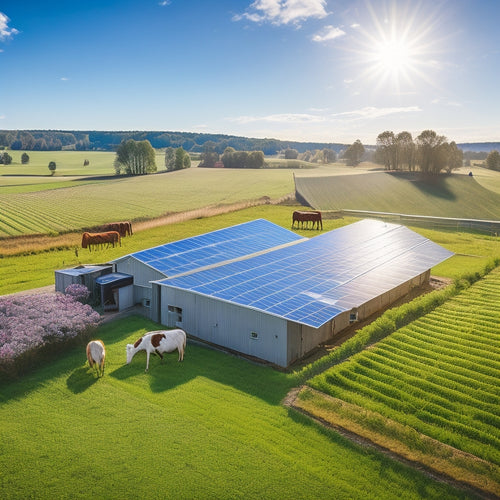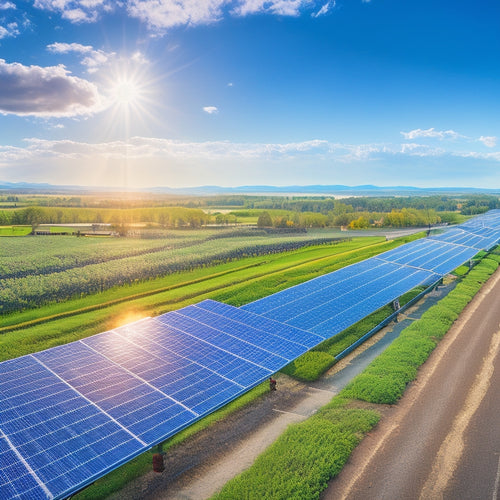
How Much Does a Mini Solar Panel Cost
Share
Mini solar panels generally range from $100 to $500 per unit. You'll also need to take into account installation costs, which can add between $500 and $2,000. These upfront costs can seem steep, but financing options and government incentives often help reduce your initial investment considerably. The efficiency and output of the panels vary with wattage ratings, determining how much energy they can generate. Over time, you'll likely see reduced electricity bills, making them a cost-effective choice. If you're contemplating mini solar panels, further exploration could reveal details that help maximize your investment.
At a Glance
- Upfront costs for mini solar panels range from $100 to $500 per panel, depending on quality and efficiency.
- Installation costs can vary significantly, falling between $500 and $2,000, depending on the complexity and location.
- Government incentives and tax credits can substantially reduce initial investment costs for mini solar panel systems.
- DIY installation options can lower overall expenses, making mini solar panels more accessible to consumers.
- The potential for long-term savings on electricity bills can significantly offset the initial costs of mini solar panels.
Cost-Effective Energy Solution
When you consider mini solar panels, it's crucial to analyze the initial investment breakdown and long-term savings potential.
Although small solar panels can have varying upfront costs depending on the brand and specifications, government incentives and tax credits can greatly offset these expenses.
You'll find that while the upfront costs can vary, the return on investment over time can greatly reduce your energy expenses.
Evaluating these factors helps you determine if this energy solution aligns with your financial goals.
Initial Investment Breakdown
Breaking down the initial investment for a mini solar panel system reveals a range of costs that can make this energy solution increasingly appealing. Typically, you'll encounter two main components: equipment and installation costs.
The price of the panels themselves can vary based on quality and efficiency, usually ranging from $100 to $500 per panel. Installation costs can also fluctuate, generally falling between $500 and $2,000, depending on the complexity of the setup and local labor rates.
To ease the financial burden, there are various financing options available. Many providers offer payment plans or lease agreements that can spread the costs over time, making it more manageable for you. Some regions even provide incentives or rebates, which can greatly lower your upfront investment.
When evaluating the initial outlay, consider both the tangible costs and the potential benefits of energy independence. By investing in a mini solar panel system, you're not just purchasing equipment; you're taking a step toward self-sufficiency and reduced reliance on traditional energy sources.
This freedom can be worth every penny of your initial investment.
Long-Term Savings Potential
How much can you save in the long run by investing in a mini solar panel system? By utilizing solar energy, you can greatly reduce your electricity bills, translating into substantial savings over time. The average homeowner could see a reduction of 50% or more in energy costs, depending on your location and energy consumption.
Additionally, opting for installment plans can make the initial investment more manageable. These plans allow you to spread the cost over time, freeing up cash for other essential expenses. As you start saving on your monthly energy bills, you'll find that the system pays for itself in just a few years.
Moreover, don't overlook tax incentives available for renewable energy investments. These incentives can reduce your upfront costs by a considerable margin, further enhancing the financial viability of your mini solar panel system. In many cases, you might even qualify for state or local rebates, increasing your savings.
Ultimately, by choosing a mini solar panel system, you're not just investing in energy independence; you're also making a cost-effective choice that pays dividends in the form of long-term savings.
Eco-Friendly Energy Generation
Mini solar panels offer a sustainable approach to energy generation by utilizing sunlight, reducing your carbon footprint.
Their compact design makes them cost-effective, allowing you to analyze both initial investment and long-term savings.
Additionally, financial incentives can greatly lower the upfront costs of installation.
Understanding these benefits can help you make informed decisions about integrating eco-friendly energy solutions into your lifestyle.
Benefits of Mini Solar
When considering sustainable energy alternatives, the benefits of mini solar panels stand out clearly. These mini solar innovations offer you a practical way to utilize energy without the constraints of traditional systems. Their compact size and lightweight design make them ideal for a variety of portable solar applications, enabling you to generate power on the go.
One of the primary advantages is their eco-friendly nature. By utilizing solar energy, you reduce your reliance on fossil fuels, greatly lowering your carbon footprint. This aligns with a growing desire for energy independence, allowing you to take control of your power generation.
Moreover, mini solar panels are incredibly versatile. Whether you're camping, traveling, or simply needing backup energy at home, these panels adapt to various scenarios. You can charge devices, power lights, or even run small appliances, expanding your energy options without being tethered to the grid.
In addition, advancements in technology have made these mini systems more efficient and affordable, making it easier for you to invest in clean energy solutions. Embracing mini solar panels isn't just a choice; it's a commitment to a sustainable future that allows you to generate your own energy.
Cost-Effectiveness Analysis
A thorough cost-effectiveness analysis of mini solar panels reveals substantial savings potential for eco-friendly energy generation.
When you assess your budget considerations, it's essential to factor in not only the installation costs but also the long-term savings on your utility bills. Mini solar panels typically have a lower upfront cost compared to traditional solar systems, making them more accessible for homeowners and renters alike.
Installation costs can vary, but many find that DIY options can greatly reduce expenses. Once installed, these panels utilize solar energy, leading to decreased reliance on grid electricity. Over time, the return on investment becomes evident as you notice reduced energy bills.
Moreover, the longevity of mini solar panels contributes to their cost-effectiveness. With proper maintenance, they can last over 20 years, meaning the initial investment pays off in the long run.
Additionally, many regions offer incentives or rebates, further enhancing financial feasibility.
Key Specifications Overview
When considering mini solar panels, understanding power output ratings and panel size options is vital for optimizing your energy needs.
These panels can be integrated into larger solar systems, thereby enhancing their overall efficiency and performance, especially when considering the key components of off-grid solar systems.
You'll find that power ratings typically range from a few watts to over a hundred, influencing their suitability for various applications.
Additionally, the size of the panels can affect installation flexibility and efficiency, making it necessary to match these specifications to your specific requirements.
Power Output Ratings
Understanding power output ratings is essential for evaluating the efficiency and suitability of mini solar panels for your energy needs. These ratings indicate how much energy a panel can generate under ideal conditions, helping you make informed decisions. When comparing different models, you'll want to reflect on both the rated wattage and the panel's power efficiency.
Here's a quick output comparison to help you visualize different mini solar panels:
| Panel Model | Rated Power (W) | Efficiency (%) |
|---|---|---|
| Model A | 10 | 18 |
| Model B | 15 | 20 |
| Model C | 20 | 22 |
| Model D | 25 | 24 |
Higher wattage means more power generation potential, but efficiency also matters. A panel with lower wattage but higher efficiency can outperform a higher wattage panel under less-than-ideal conditions. So, as you examine your options, keep an eye on both ratings—this will enable you to choose a mini solar panel that fits your specific energy needs, ultimately granting you greater freedom in how you utilize solar energy.
Panel Size Options
Evaluating mini solar panels also involves considering their size options, which play a significant role in determining where and how you can install them. Panel dimensions vary widely, typically ranging from compact 10-watt models to larger 50-watt units. Smaller panels are ideal for portable applications, like charging devices or powering small appliances in RVs or off-grid setups. In contrast, larger panels can provide more substantial energy output but require more space for installation.
When evaluating panel size, weight considerations are vital too. Lightweight panels can be easily mounted on various surfaces, making them versatile for different locations like rooftops, boats, or even backpacks. However, heavier panels might demand more sturdy mounting systems, which could limit your installation options.
It's important to balance your energy needs with the physical constraints of your intended installation area. Choosing the right panel size guarantees you maximize efficiency while maintaining flexibility in deployment.
Always measure the available space and consider the panel's weight to guarantee a secure and effective installation. This careful analysis will enable you to utilize solar energy effectively, enhancing your freedom to go off-grid or simply reduce your reliance on traditional power sources.
Selecting Based on Power Output
When selecting a mini solar panel, understanding power output ratings is essential for matching your energy needs.
Different usage scenarios, such as charging devices or powering small appliances, require varying power levels.
For instance, in agricultural settings, a mini solar panel can be part of a broader strategy to enhance energy management by integrating with energy storage systems that maximize renewable energy use.
Evaluating these factors will help you choose a panel that best meets your requirements.
Power Output Ratings
Selecting a mini solar panel based on power output ratings is essential for ensuring your energy needs are met efficiently. The power ratings of these panels, typically measured in watts, directly influence the amount of energy they can generate. When you assess different models, look for panels with higher wattage if you require more energy for your devices or applications.
To make an informed decision, consider conducting an efficiency comparison among various mini solar panels. Efficiency refers to how well a panel converts sunlight into usable electricity. A panel with a higher efficiency rating will generate more power in less space, which is particularly important if you're limited on installation area.
Additionally, take into account the conditions under which you'll be using the panel. Standard testing conditions often assume ideal sunlight, but real-world scenarios can vary. It's wise to select a panel that not only meets your power requirements but also performs reliably across different lighting situations.
Ultimately, understanding power output ratings allows you to choose a mini solar panel that aligns perfectly with your energy independence goals, maximizing your investment and enhancing your freedom.
Usage Scenarios Explained
Understanding how power output ratings apply to specific usage scenarios is essential to making the right choice in mini solar panels. If you're focused on portable applications, look for panels that generate enough power for gadget charging during outdoor activities.
For camping solutions, a panel with a modest output can keep your devices charged without the need for an electrical grid, promoting energy independence and sustainable living.
For backup power, especially in remote locations, opt for panels with higher wattage to guarantee you have enough energy for essential devices. This power can be vital during seasonal use when traditional power sources may fail.
If you're into DIY projects, consider panels that allow for custom setups customized to your specific needs.
The right mini solar panel can make a significant difference in how you experience outdoor activities and remote excursions. With the right selection, you'll not only enjoy the freedom that comes with energy independence but also contribute to a more sustainable lifestyle.
Always assess your power requirements carefully, and choose a panel that meets your needs to maximize your mini solar panel investment.
Higher Efficiency per Square Foot
When you're considering mini solar panels, higher efficiency per square foot can greatly impact your installation's overall effectiveness.
By maximizing energy output in limited spaces, you can optimize your available area and potentially reduce costs.
This efficiency not only enhances performance but also minimizes the need for additional panels, making it a practical choice for space-constrained environments.
Space Optimization Benefits
Mini solar panels offer significant space optimization benefits, providing higher efficiency per square foot compared to traditional panels.
Their compact design means you can utilize solar energy in areas where larger panels simply won't fit, such as small rooftops, balconies, or limited outdoor spaces. This is particularly advantageous for urban dwellers who want to maximize their energy independence without sacrificing important real estate.
By enhancing space utilization, mini solar panels allow you to convert more sunlight into usable energy without needing extensive installation areas.
This efficiency is essential when considering the overall energy output relative to the space occupied. You'll find that these panels can generate a substantial amount of power, making them ideal for those who desire a sustainable lifestyle while living in tighter quarters.
Moreover, the installation process is less intrusive, meaning you can achieve energy freedom without overwhelming your surroundings.
You'll have the flexibility to position these panels in a way that best suits your available space, optimizing both aesthetics and functionality.
Fundamentally, mini solar panels enable you to take control of your energy needs, all while making the best use of the space you have.
Frequently Asked Questions
What Are the Installation Costs for Mini Solar Panels?
When considering installation costs for mini solar panels, you'll encounter various installation options and cost factors, including labor, materials, and system size. Evaluating these elements helps you determine the most cost-effective solution for your needs.
How Long Do Mini Solar Panels Typically Last?
Imagine a trusty old flashlight; mini solar panels typically last 15-25 years. Their lifespan varies based on factors affecting durability, like weather conditions, installation quality, and maintenance. Proper care guarantees your energy freedom endures longer.
Can Mini Solar Panels Power Household Appliances?
Mini solar panels can power small household appliances, depending on their types and efficiency. You'll find that higher efficiency models can sustain more devices, offering you a degree of energy independence and freedom in your usage.
Are There Any Maintenance Requirements for Mini Solar Panels?
Mini solar panels require minimal maintenance. Regular cleaning techniques guarantee efficiency, while performance monitoring helps you track energy output. By staying proactive, you can maximize their benefits and enjoy greater energy independence.
Do Mini Solar Panels Come With Warranties?
When you investigate mini panel brands, you'll find most offer warranty coverage. These warranties, like safety nets, protect your investment against defects and performance issues, ensuring you enjoy the freedom of reliable, renewable energy.
Explore More
As you weigh the costs of mini solar panels, consider not just the price tag but the long-term benefits they can bring. Imagine utilizing the sun's power for your devices, reducing your carbon footprint, and even saving on energy bills. Yet, the decision isn't as straightforward as it seems. What if the perfect panel for your needs is just a bit out of reach? Stay tuned, as the right choice could redefine your energy strategy.
Related Posts
-

What Do I Need to Know About Farm Solar Panels
When considering farm solar panels, you need to assess costs, benefits, and technical specifics. Initial investment c...
-

Top 10 Off Grid Camping Gear Must-Haves
When you're off-grid camping, the right gear is crucial for a smooth expedition. Start with a durable, weather-resist...
-

Applications of Photovoltaic Systems
Photovoltaic systems are versatile, converting sunlight into electricity for various applications. You can use them i...


